
🧠 We are recruiting a fully-funded PhD student (Fall ‘26) to study attention in kids using fMRI, MRS & eye-tracking.
📩 Email Dr. Andrew Lynn to inquire (UofL website under construction).
🔗 Visit www.theandlab.org/work-with-us to learn more.
@andrewclynn.bsky.social
Developmental Cognitive Neuroscientist | he/they 🏳️🌈 | Yogi 🧘🏼♂️ | Politics | Dog Lover 🐶

🧠 We are recruiting a fully-funded PhD student (Fall ‘26) to study attention in kids using fMRI, MRS & eye-tracking.
📩 Email Dr. Andrew Lynn to inquire (UofL website under construction).
🔗 Visit www.theandlab.org/work-with-us to learn more.

🧠 @theandlab.org is recruiting a fully-funded PhD student (Fall ‘26) to study attention in kids using fMRI, MRS & eye-tracking.
📩 Email me to inquire (UofL website under construction).
🔗 Visit www.theandlab.org/work-with-us to learn more.

🚨 ATTN Parents & Teachers: Check out this short webinar (30min!) with @douglasashli.bsky.social to learn how you can start supporting children's math learning EARLY! #childdevelopment #stemlearning #earlychildhood #education
www.wested.org/event/advanc...
I would love to hear how others are dealing with the incredibly strict new security regulations for NIH data. UofL doesn’t have compliance with the new requirements and our 3rd party options are cost prohibitive.
06.08.2025 03:32 — 👍 2 🔁 2 💬 1 📌 0Coming June 2025! We are excited to launch the NIH Brain Development Cohorts (NBDC) Data Hub. This new data ecosystem will host & facilitate access to data from the Adolescent Brain Cognitive Development (ABCD) Study & the HEALthy Brain and Child Development (HBCD) Study.
1/13
"Did you notice anything unusual?"
"No."
"Well, something unusual appeared; where do you think it was?"
…
Our new @elife.bsky.social paper on inattentional blindness finishes this dialogue in 25,000 subjects, with implications for the relation between attention and awareness. See below!
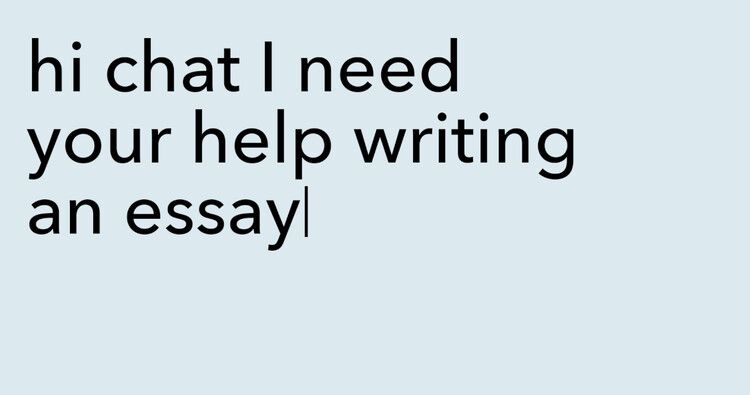
It’s clear this is happening in my courses but there are no good tools to detect AI cheating. I’m not doing the extra work of trying to reimagine my curriculum.
apple.news/APIS2Hf0gQAe...
With all that is going on at NSF, it’s important for me to describe how important NSF has been for my career and the careers of my trainees over the years. This funding is so important for so many reasons.
10.05.2025 10:37 — 👍 53 🔁 14 💬 2 📌 0The war on science accelerates.
09.05.2025 13:34 — 👍 0 🔁 0 💬 0 📌 0Eyes on the prize: @andrewclynn.bsky.social studies how children stay focused and learn 👁️🧠📝
#academicsky #neurosky #learning #attention #neurodevelopment #adhd #autismspectrumdisorder

Director of the Nat'l Institute of Child Health and Human Development (NICHD) was summarily dismissed yesterday. So here's your reminder that birth defects kill twice as many American kids as cancer. But there is no St. Jude's for birth defects. Only the NICHD.
www.nature.com/articles/d41...
It’s insane that schatzel can make more by quitting her job than I’ll make in 10 years as a professor.
“Under the agreement, Schatzel will receive $400,000 plus unspecified deferred compensation over the next month.
She also will receive $300,000 in monthly installments starting April 15. “
Excited to share on my first post on Bluesky our new paper in NHB examine the innate and developing aspects of the wiring of the visual system. Congratulations to @emilykubota.bsky.social and the baby MRI team on this important work
21.03.2025 18:08 — 👍 85 🔁 28 💬 1 📌 0
I'm completely losing my mind www.nytimes.com/2025/03/21/n...
21.03.2025 22:48 — 👍 1074 🔁 313 💬 30 📌 46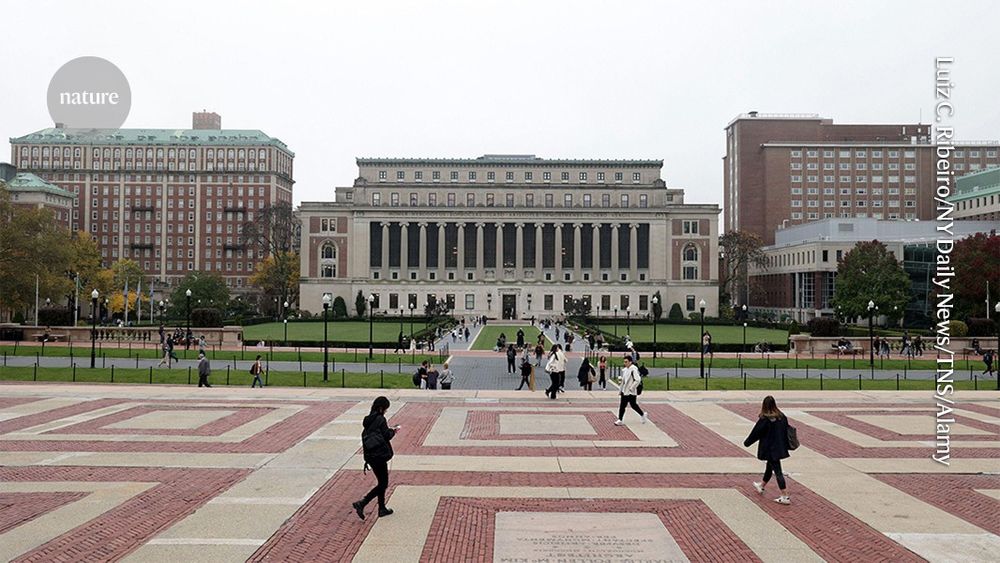
These cuts are ruining people’s careers. This is not efficiency - capricious changes to funding damage science for generations.
www.nature.com/articles/d41...
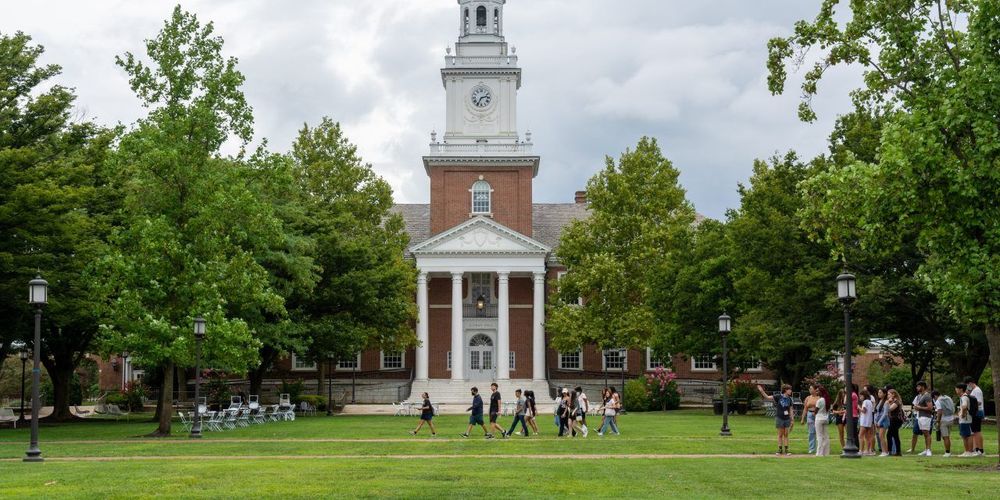
The Trump administration has terminated $800 million in grants to Johns Hopkins University, spurring the nation’s top spender on research and development to plan layoffs and cancel health projects
11.03.2025 21:03 — 👍 1325 🔁 980 💬 134 📌 401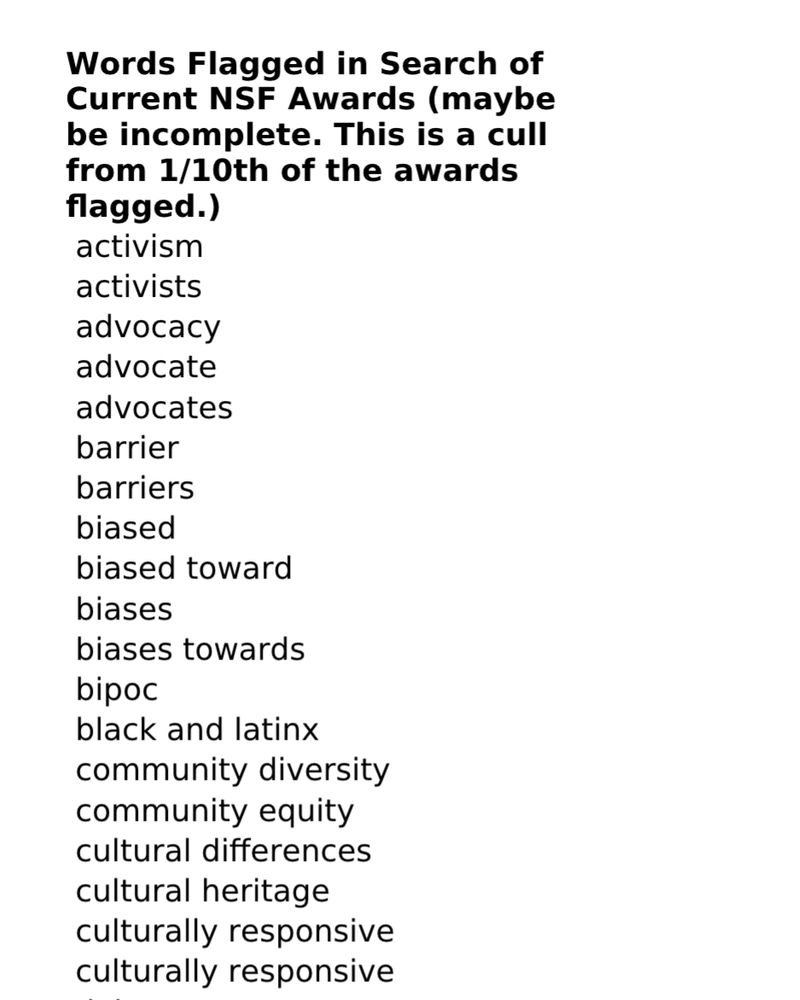
list of banned keywords
🚨BREAKING. From a program officer at the National Science Foundation, a list of keywords that can cause a grant to be pulled. I will be sharing screenshots of these keywords along with a decision tree. Please share widely. This is a crisis for academic freedom & science.
04.02.2025 01:26 — 👍 27921 🔁 15813 💬 1279 📌 3689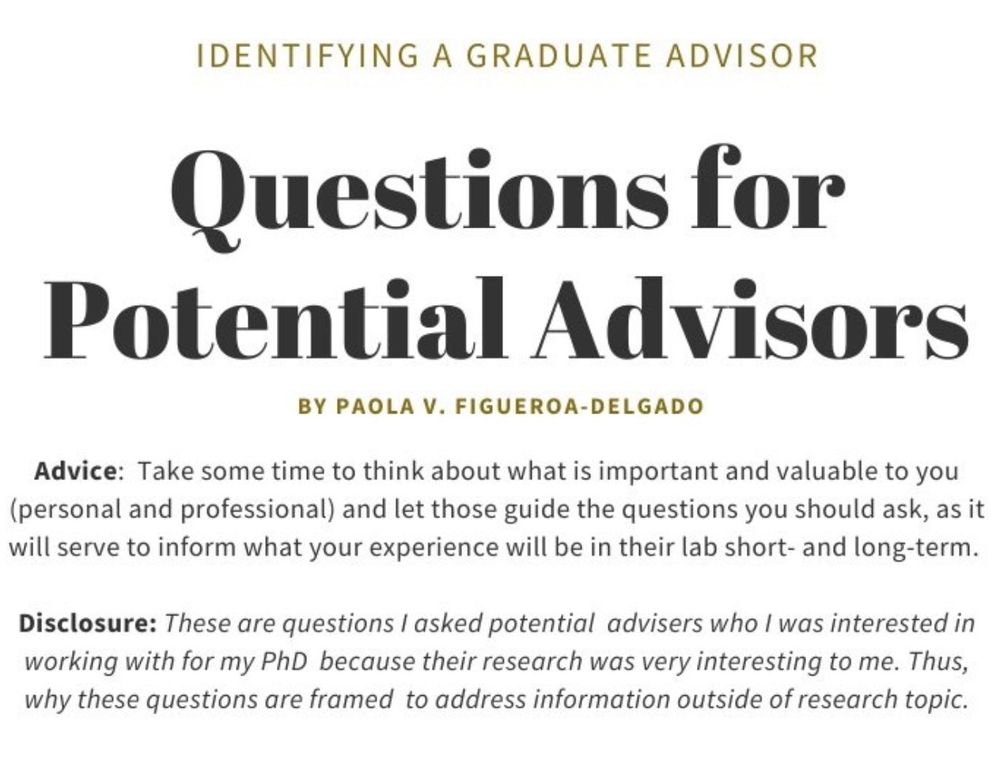
IDENTIFYING A GRADUATE ADVISOR Questions for Potential Advisors BY PAOLA V. FIGUEROA-DELGADO Advice: Take some time to think about what is important and valuable to you (personal and professional) and let those guide the questions you should ask, as it will serve to inform what your experience will be in their lab short- and long-term. Disclosure: These are questions I asked potential advisers who I was interested in working with for my PhD because their research was very interesting to me. Thus, why these questions are framed to address information outside of research topic.
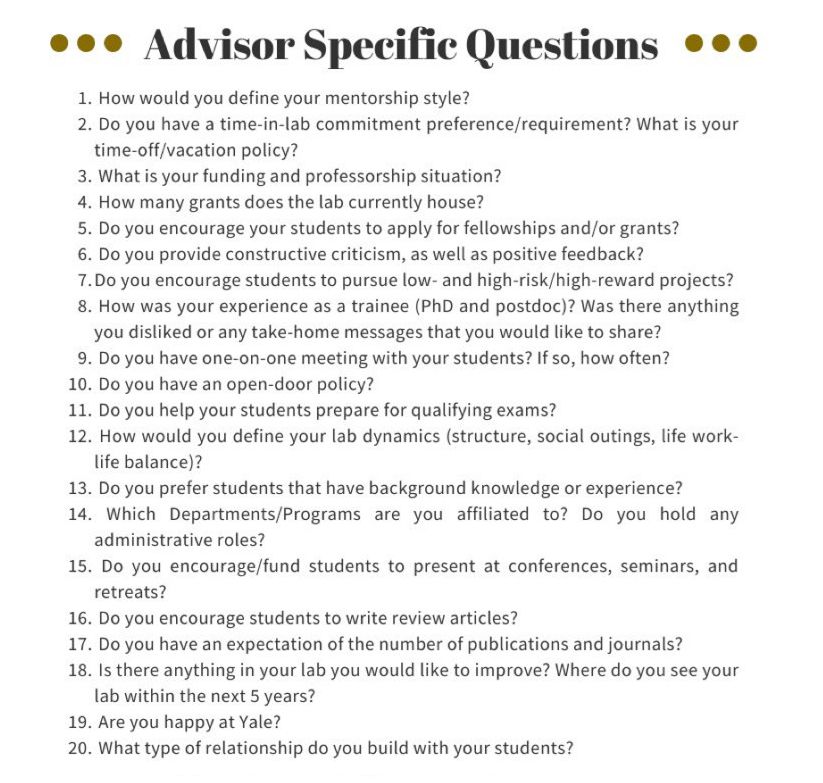
... Advisor Specific Questions ... 1. How would you define your mentorship style? 2. Do you have a time-in-lab commitment preference/requirement? What is your time-off/vacation policy? 3. What is your funding and professorship situation? 4. How many grants does the lab currently house? 5. Do you encourage your students to apply for fellowships and/or grants? 6. Do you provide constructive criticism, as well as positive feedback? 7. Do you encourage students to pursue low- and high-risk/high-reward projects? 8. How was your experience as a trainee (PhD and postdoc)? Was there anything you disliked or any take-home messages that you would like to share? 9. Do you have one-on-one meeting with your students? If so, how often? 10. Do you have an open-door policy? 11. Do you help your students prepare for qualifying exams? 12. How would you define your lab dynamics (structure, social outings, life work- life balance)?
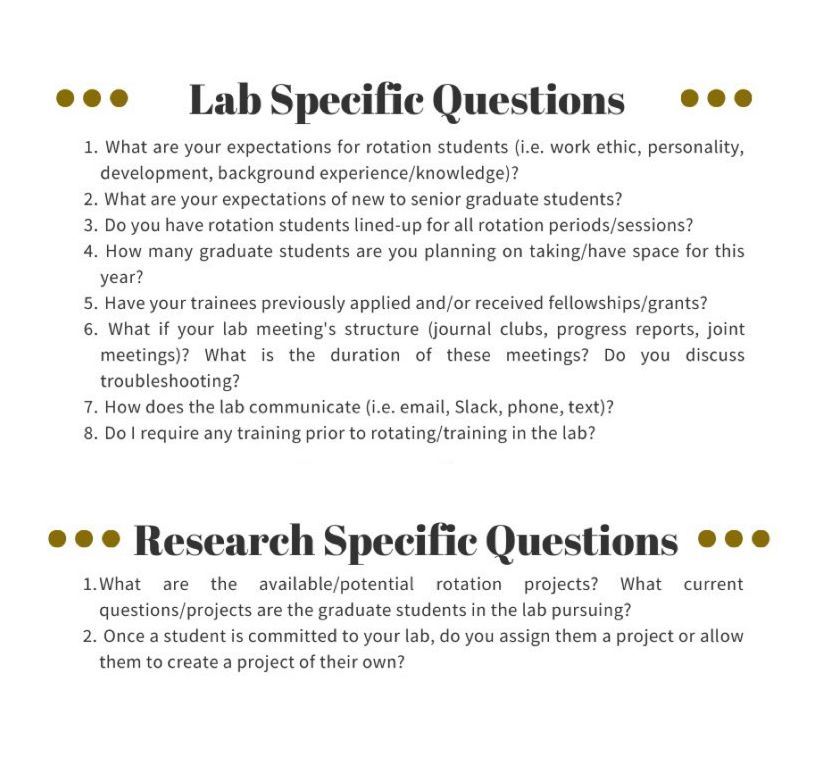
Lab Specific Questions 1. What are your expectations for rotation students (i.e. work ethic, personality, development, background experience/knowledge)? 2. What are your expectations of new to senior graduate students? 3. Do you have rotation students lined-up for all rotation periods/sessions? 4. How many graduate students are you planning on taking/have space for this year? 5. Have your trainees previously applied and/or received fellowships/grants? 6. What if your lab meeting's structure (journal clubs, progress reports, joint meetings)? What is the duration of these meetings? Do you discuss troubleshooting? 7. How does the lab communicate (i.e. email, Slack, phone, text)? 8. Do I require any training prior to rotating/training in the lab?
💡 Choosing a grad school advisor is one of the most important decisions you'll make on your academic journey. 🧠💼
✨ Read the full article by Paola Figueroa-Delgado: cientificolatino.com/post/questio...
Introducing PowerLMM.js!
A new tool for power analysis of longitudinal linear mixed-effects models (LMMs) – with support for missing data, plus non-inferiority and equivalence tests.
powerlmmjs.rpsychologist.com
Would really appreciate your feedback as I refine this app! Details below 🧵👇
Middle childhood is a time of major biological change (puberty) and contextual change (elementary to middle school)--could this be an important timepoint for understanding important changes in the individual and perhaps an intervention point? Find out here: onlinelibrary.wiley.com/share/SSWWK7...
06.12.2024 02:51 — 👍 33 🔁 12 💬 1 📌 0Any chance I can get you to send me this article? My university is a mess with regard to journal subscriptions and I can’t access it for some reason.
05.12.2024 01:49 — 👍 0 🔁 0 💬 0 📌 0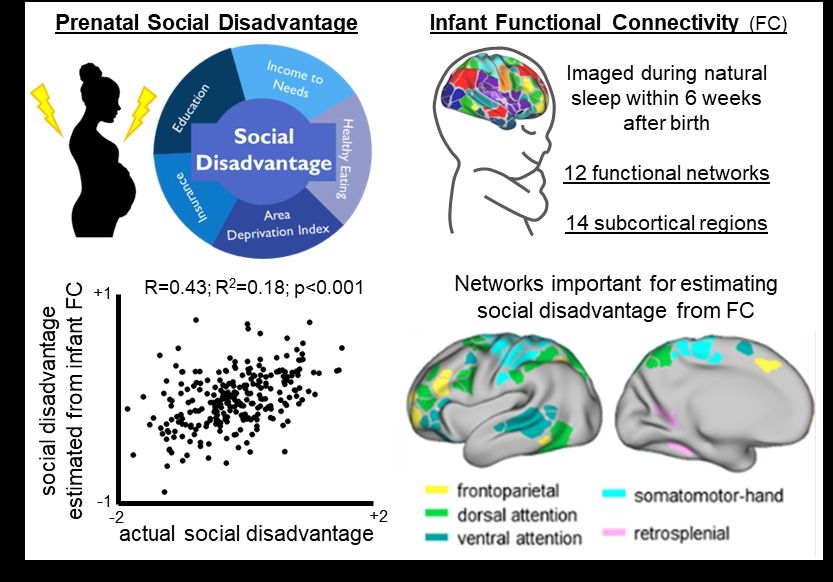
New paper out today in PNAS 🎉 demonstrating:
1) an association between social disadvantage & child brain function can be observed as early as birth
2) these alterations are brain-wide, but most pronounced in functional networks & subcortex later linked to childhood adversity
doi.org/10.1073/pnas...
#Neuroimaging crowd, hear me out! 👀
Did you ever want to add #EyeTracking to your #fMRI study but found it too much hassle? Got existing data you’d love to add eye tracking to?
Consider trying out *MR-based eye tracking* (i.e. inferring gaze from eye voxels)!
Here is a 🧵 with a few options!👇 1/9
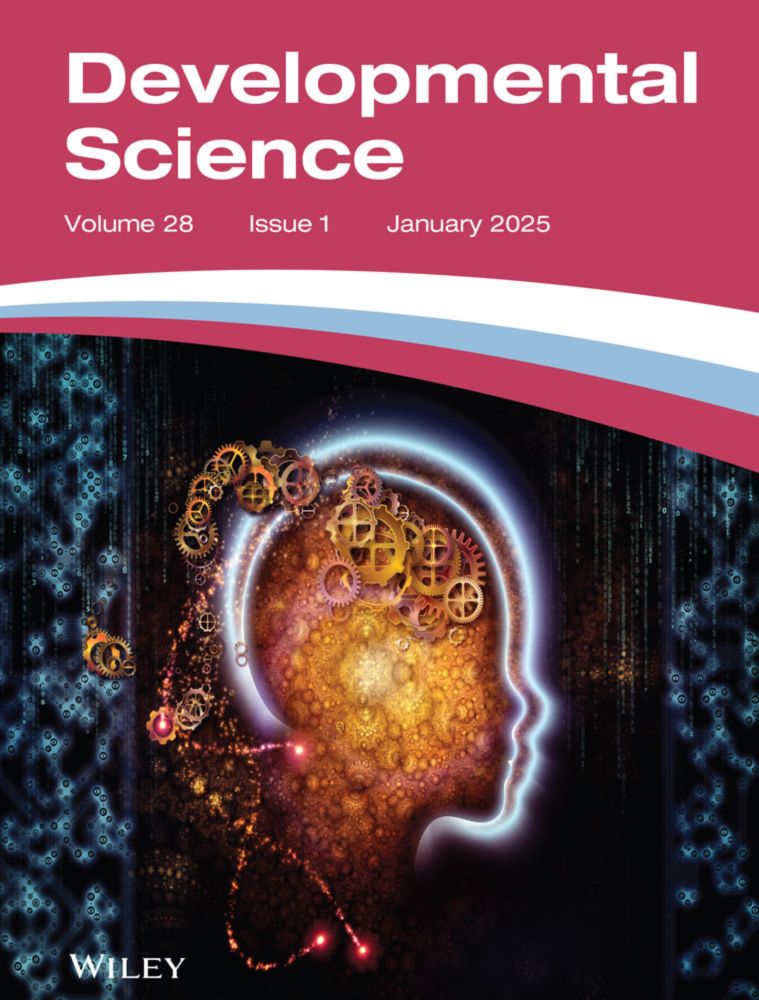
wow onlinelibrary.wiley.com/doi/10.1111/... (a huge replication study of a highly-cited phenomenon in infant development that found said phenomenon does not replicate)
27.11.2024 14:50 — 👍 15 🔁 9 💬 3 📌 1𝗦𝗽𝗲𝗰𝗶𝗮𝗹 𝗜𝘀𝘀𝘂𝗲 𝗶𝗻 𝗺𝗲𝗺𝗼𝗿𝘆 𝗼𝗳 𝗼𝘂𝗿 𝗺𝗲𝗻𝘁𝗼𝗿 𝗟𝗲𝘀𝗹𝗶𝗲 𝗨𝗻𝗴𝗲𝗿𝗹𝗲𝗶𝗱𝗲𝗿 𝗶𝗻 𝘁𝗵𝗲 𝗝𝗼𝘂𝗿𝗻𝗮𝗹 𝗼𝗳 𝗖𝗼𝗴𝗻𝗶𝘁𝗶𝘃𝗲 𝗡𝗲𝘂𝗿𝗼𝘀𝗰𝗶𝗲𝗻𝗰𝗲
Beautiful set of articles (mine excepted), paying tribute to Leslie's pioneering career.
And thanks to JOCN for doing this for the community.
#neuroscience
direct.mit.edu/jocn/collect...
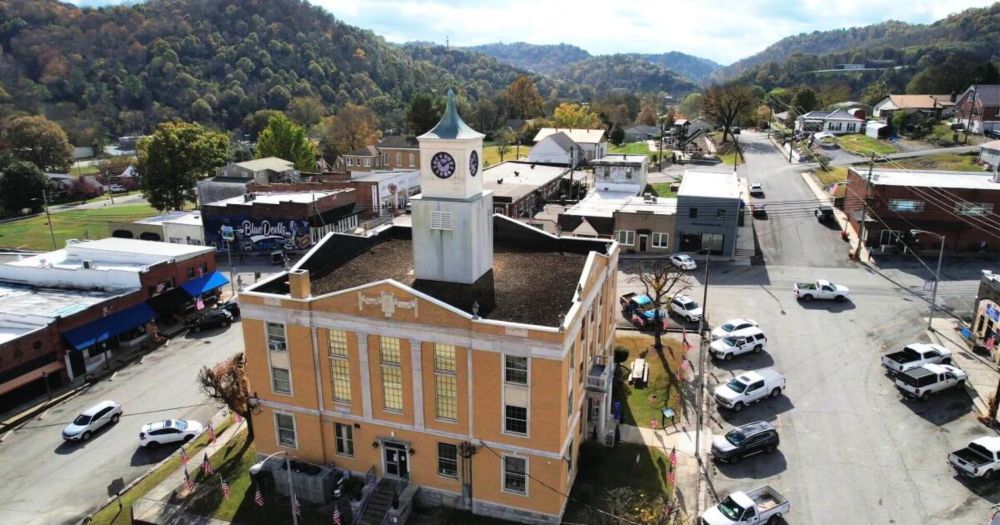
They want to go back to an America before the civil rights movement "ruined everything." They want to kick out legal immigrants even if they became U.S. citizens decades ago. And they want to put women back where they think they belong. www.newschannel5.com/news/newscha...
18.11.2024 19:40 — 👍 697 🔁 281 💬 41 📌 44Do we need another starter pack? I'm erring on the side of yes.
go.bsky.app/GVMZMcB

On today's edition of "Sh*t I wish I knew 8 years ago"
Simple "isolate" function from blml package to get within- and between-person centered versions of a list of variables.
H/t to kzee.github.io/Centering_De...
#Rstats #AcademicSky
The basic principle is that reviewers are tired, they're rushed, they're reading your and 10 other grants on top of their normal workload.
Anything you can do to make it easy for them will help.
Here's a list of my suggestions.